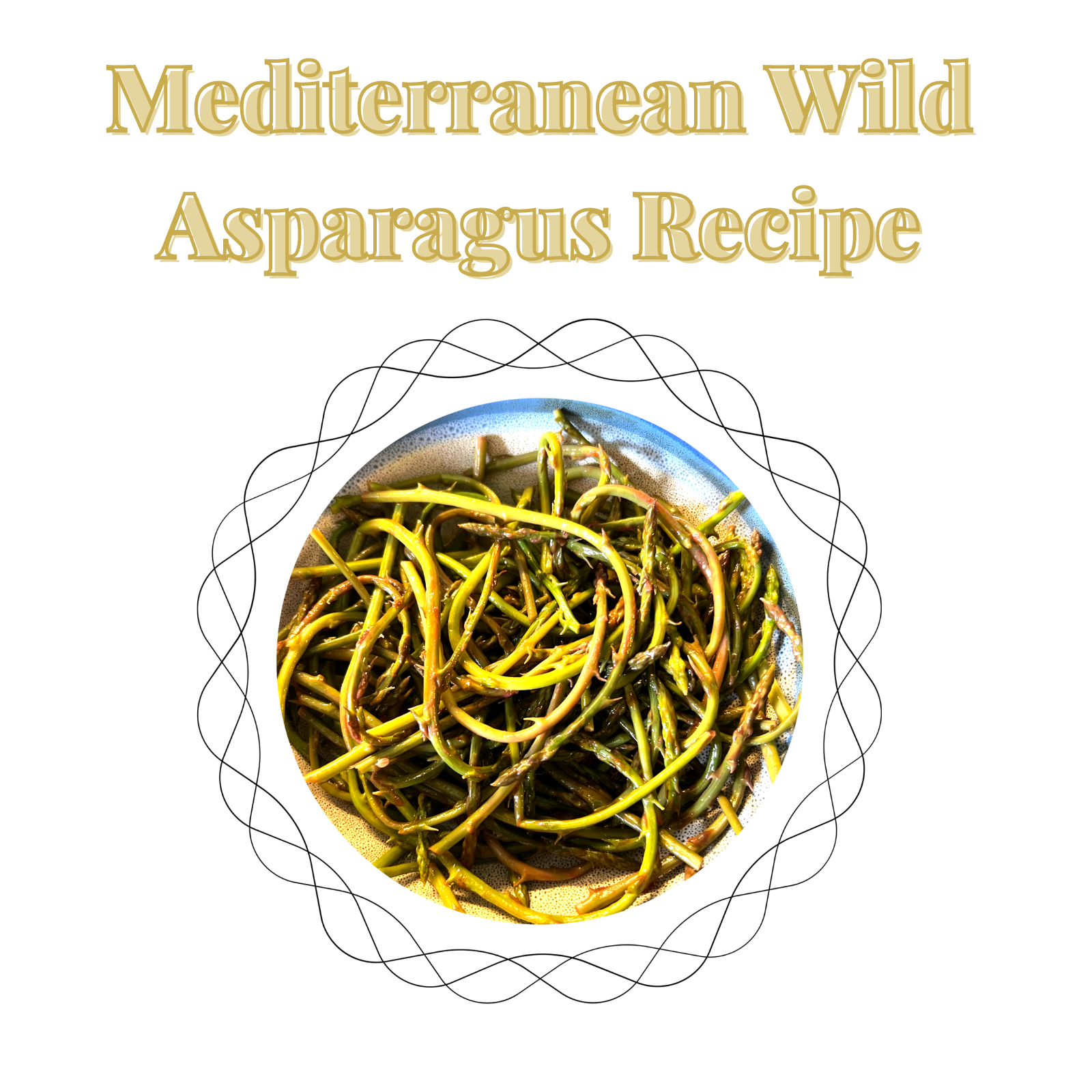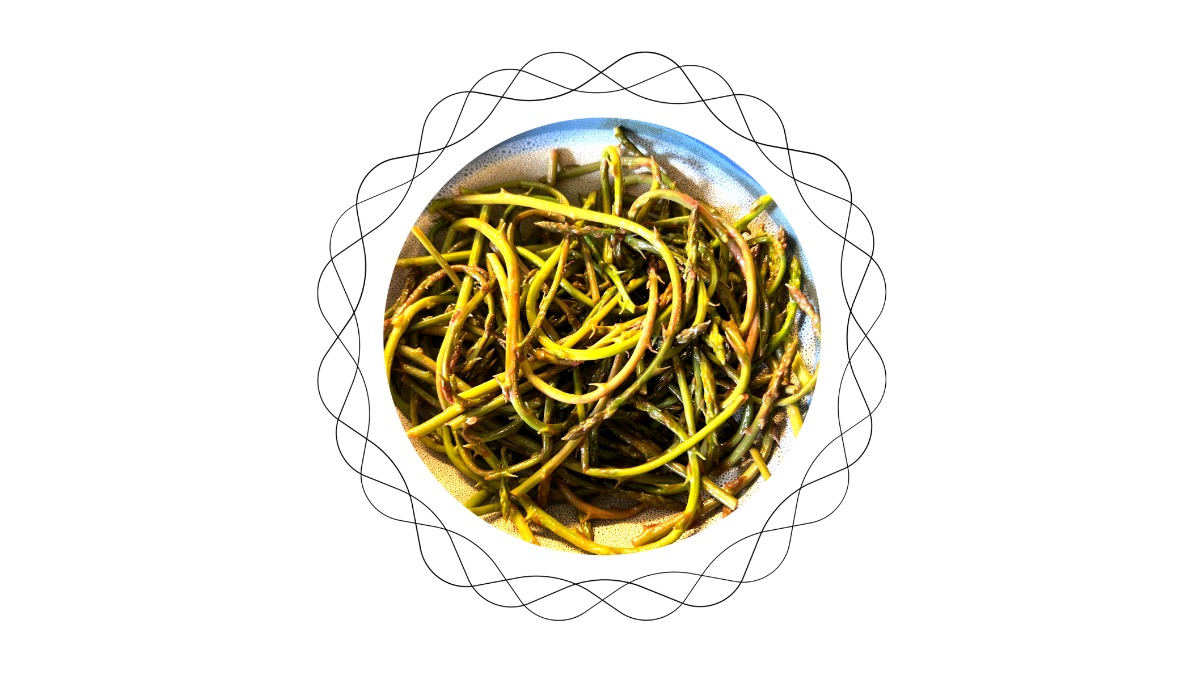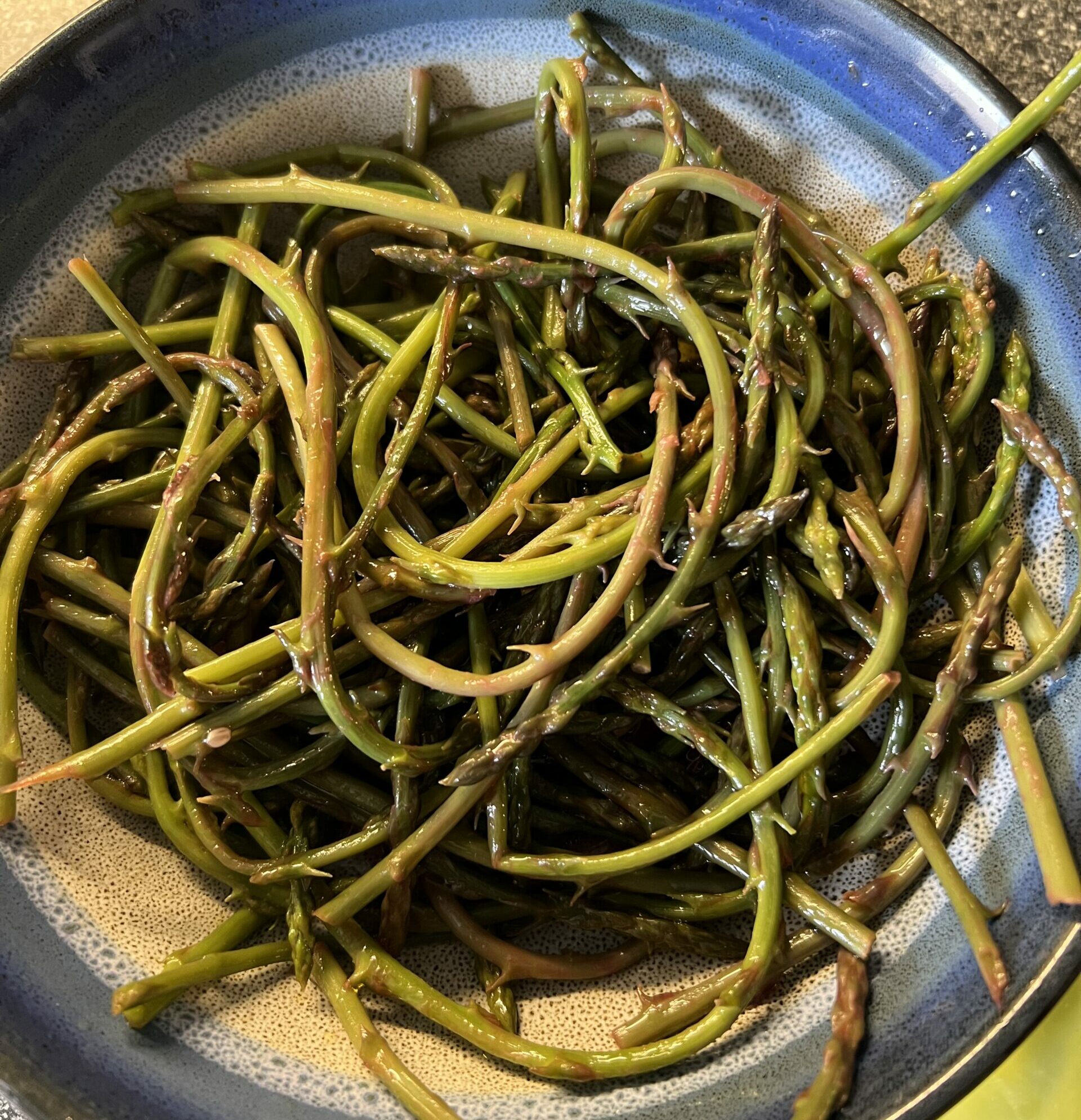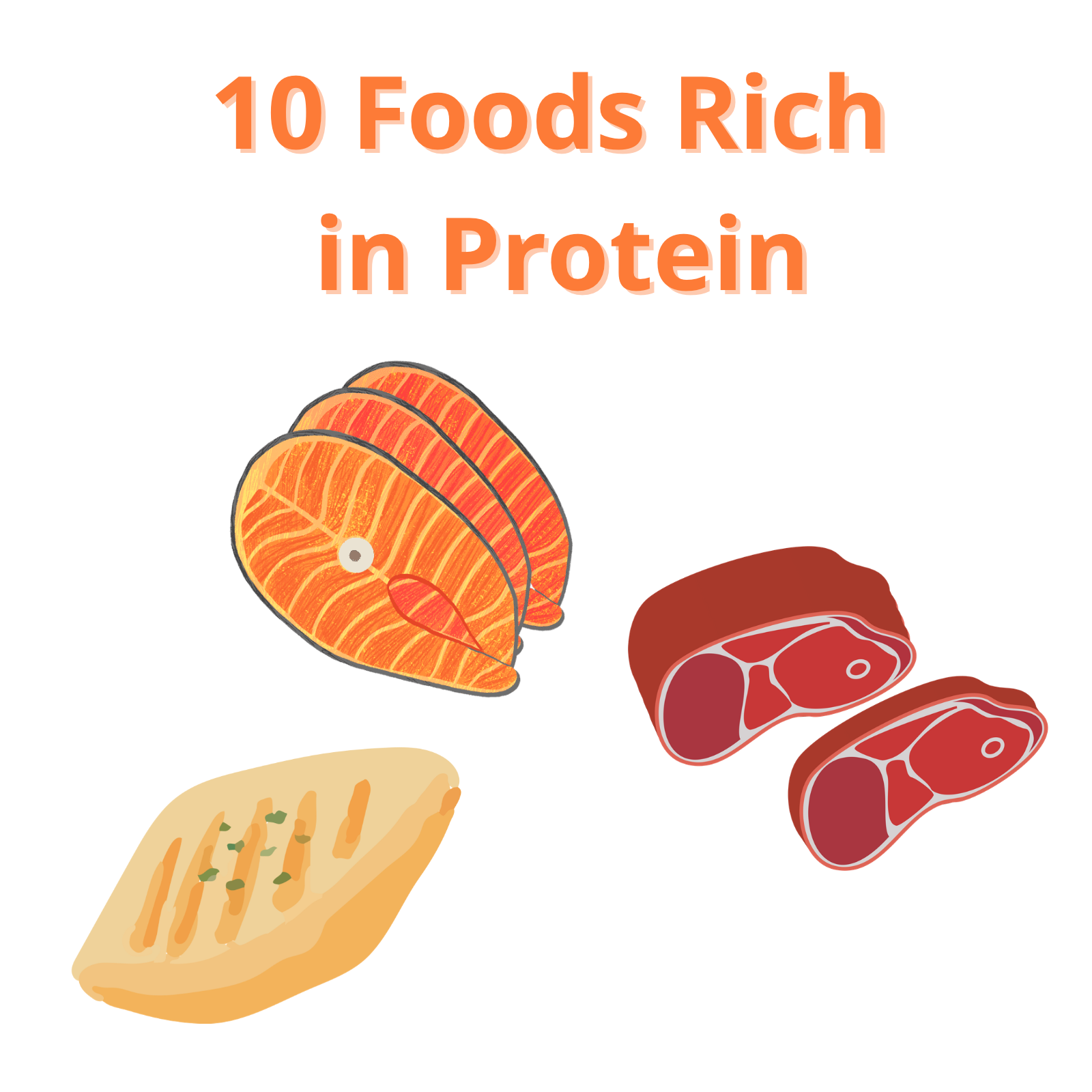
Mediterranean Wild Asparagus Recipe
Introduction

A taste of spring: Mediterranean Wild Asparagus Recipe
As the last chills of winter recede, the Mediterranean landscape awakens with a vibrant flush of green. For those in the know, this signals the start of a cherished seasonal tradition: the hunt for wild asparagus. Far from the uniformly thick spears found in supermarkets, wild asparagus is a delicate, intensely flavored treasure, a true embodiment of spring’s untamed energy. This article delves into the world of this remarkable vegetable, exploring its unique characteristics, profound health benefits, and the simple, elegant culinary preparations that allow its character to shine. We are going to explore the quintessential Mediterranean Wild Asparagus Recipe, a dish that is not only a delight for the palate but also a nutrient-packed superfood that promotes excellent gut health and overall wellness. This is a cornerstone of healthy eating and a perfect example of how delicious Food & Cooking can be when rooted in tradition and nature.
While most are familiar with the cultivated varieties—the common green, the milder white, or the slightly sweeter purple—wild asparagus (*Asparagus acutifolius*) is an entirely different experience. Its slender, almost wiry stalks pack a concentrated flavor that is both earthy and slightly bitter, with a nutty complexity that speaks of its wild origins. This unique taste profile is a testament to its rich nutrient content. Today, we celebrate this foraged gem with a recipe that is purely Mediterranean in spirit, using high-quality olive oil, fresh lemon, and wild oregano to complement, rather than mask, its incredible flavor. Join us as we uncover the secrets to preparing this seasonal delicacy and integrating it into a lifestyle focused on Health & Wellness.
The Allure of Wild Asparagus: A Mediterranean Gem
The magic of wild asparagus lies in its connection to the land and to age-old traditions. It’s not just a vegetable; it’s an experience that begins with a walk through sun-dappled olive groves and rocky hillsides. Understanding its nature is the first step to appreciating its culinary potential.
What Exactly is Wild Asparagus?
Botanically known as *Asparagus acutifolius*, wild asparagus is the untamed ancestor of the common asparagus (*Asparagus officinalis*) we buy in stores. Visually, the difference is stark. Wild spears are incredibly thin, sometimes no thicker than a piece of straw, and range from a deep green to a purplish hue. They emerge from a thorny, shrub-like plant, making the harvest a careful, deliberate process. This effort is richly rewarded with a flavor that is leagues beyond its cultivated cousin.
The taste is where wild asparagus truly distinguishes itself. The original article notes its “bitter medicinal earthy flavor,” and this is an apt starting point. However, the bitterness is not unpleasant; it’s a complex, sophisticated note that balances beautifully with its other characteristics. Connoisseurs describe the flavor as intensely herbaceous, deeply nutty, and assertively “green.” This robust profile is a direct result of the plant’s struggle to survive in the wild, producing more concentrated phytonutrients and flavor compounds. This focus on natural ingredients is a key aspect of Sustainable Living and Green Living, connecting us directly to our food source.

Cultivated varieties: Green, White, and Purple Asparagus
A Cherished Tradition of Foraging
In Mediterranean countries like Greece, Italy, Croatia, and Spain, foraging for wild asparagus (*sparagia* in Greek, *asparagi selvatici* in Italian) is a beloved springtime ritual. It’s a social activity, often enjoyed by families and friends, that marks the changing of the seasons. This practice is more than just gathering food; it’s about connecting with nature, passing down knowledge from one generation to the next, and embracing the principles of eating locally and seasonally. This mindful activity can be a form of Meditation in motion, fostering a sense of peace and improving Mental Health. Finding these wild spears is a treasure hunt, requiring a keen eye to spot the delicate shoots emerging from beneath shrubs and along old stone walls. You typically won’t find this variety in large chain stores, but a visit to a local farmer’s market in the spring might prove fruitful.
Nutritional Powerhouse: More Than Just a Flavorful Spear
The intense flavor of wild asparagus is a clear indicator of its dense nutritional profile. Wild foods often contain higher levels of vitamins, minerals, and protective compounds than their commercially grown counterparts. This makes wild asparagus a key ingredient for anyone interested in Nutrition News and building Healthy Recipes.
A Deep Dive into Health Benefits
Wild asparagus is a formidable source of essential nutrients that contribute to overall health and vitality. Its benefits are wide-ranging and scientifically supported:
- Rich in Vitamins and Minerals: It is an excellent source of Vitamin K, crucial for blood clotting and bone health; Vitamin A, essential for vision and immune function; Vitamin C, a powerful antioxidant; and folate, which is vital for cell growth and metabolism. It also provides significant amounts of iron and copper.
- Superb for Gut Health: Asparagus is packed with insoluble and soluble fiber, particularly a type of prebiotic fiber called inulin. Prebiotics act as food for the beneficial bacteria in your gut (like Bifidobacteria and Lactobacilli), helping to cultivate a healthy microbiome. A thriving gut is linked to improved digestion, a stronger immune system, and even better mental health. This makes it a fantastic choice for any Meal Planning focused on digestive wellness.
- Potent Antioxidant Properties: It is loaded with antioxidants, including flavonoids and polyphenols. These compounds help protect your cells from the damaging effects of free radicals and oxidative stress, which can reduce the risk of chronic diseases.
- Natural Diuretic: Asparagus contains the amino acid asparagine, which gives it natural diuretic properties. This helps the body flush out excess salt and fluids, making it beneficial for reducing bloating and supporting kidney function. This aligns with principles of Holistic Health and using food as a form of Alternative Medicine.
Wild vs. Cultivated: A Nutritional Showdown
While any asparagus is good for you, the wild variety generally has an edge. Growing in its natural, often challenging environment, the plant produces higher concentrations of protective phytochemicals to defend itself. This “stress” results in a more nutrient-dense food. The deeper color and more intense, slightly bitter taste are direct indicators of these higher levels of antioxidants and phytonutrients. By choosing wild, you are getting a more potent version of this already healthy vegetable, a perfect example of nature’s wisdom.
The Art of Cooking Wild Asparagus: Simplicity is Key
When you have an ingredient as special as wild asparagus, the goal is to honor its natural flavor, not to mask it. The Mediterranean culinary philosophy champions this approach, using simple techniques and high-quality ingredients to create sublime dishes. This is a core principle of good Food & Cooking.
Preparation: The First Crucial Step
Before cooking, proper preparation is essential to ensure the best texture and taste. Because it’s foraged, wild asparagus needs a little more care than its store-bought cousin.
- Cleaning: Submerge the spears in a bowl of cold water and gently swish them around to dislodge any dirt or grit from the tips. Rinse them thoroughly under cool running water.
- Trimming: Wild asparagus has a naturally tough, woody end. The best way to find the right spot to trim is to hold the spear with both hands and gently bend it. It will naturally snap at the point where the tough base meets the tender stalk. Discard the woody ends (or save them for a vegetable stock).
Exploring Mediterranean Cooking Methods
While our featured recipe uses steaming—an excellent method for preserving nutrients—there are several other wonderful ways to cook wild asparagus:
- Sautéing: This is a quick and popular method. Heat a generous amount of extra virgin olive oil in a skillet over medium-high heat. Add a crushed garlic clove for aroma. Add the asparagus and sauté for just 3-5 minutes, until tender-crisp. The direct heat caramelizes the asparagus slightly, enhancing its nutty flavor.
- In Frittatas or Omelets: Wild asparagus and eggs are a classic Mediterranean pairing. Briefly blanch or sauté the chopped asparagus spears before adding them to your egg mixture. This ensures they are perfectly cooked within the frittata.
- Grilling: For a smoky flavor, toss the spears in olive oil, salt, and pepper, and place them on a hot grill (perpendicular to the grates, or in a grill basket) for a few minutes until lightly charred and tender.
The Ultimate Mediterranean Wild Asparagus Recipe & Pairings
Now we arrive at the heart of our culinary journey: a simple, elegant recipe that lets the wild asparagus be the star. This method is all about celebrating the pure, unadulterated taste of spring. It’s a perfect appetizer, side dish, or light main course that embodies the healthy Mediterranean lifestyle.

Mediterranean Wild Asparagus Recipe
You may also like

Do People in Greece Like Americans

10 Foods Rich in Protein

10 Foods Rich In Fiber
Archives
- February 2026
- January 2026
- December 2025
- November 2025
- October 2025
- September 2025
- August 2025
- July 2025
- June 2025
- May 2025
- April 2025
- March 2025
- January 2024
- October 2023
- September 2023
- August 2023
- July 2023
- June 2023
- May 2023
- April 2023
- March 2023
- February 2023
- January 2023
- December 2022
- November 2022
- October 2022
- September 2022
- August 2022
- June 2022
- May 2022
- April 2022
- March 2022
- January 2022
- December 2021
- November 2021
- October 2021
- August 2021
- November 2020
- July 2020
- May 2020
- April 2020
- March 2020
- August 2018
- July 2018
- June 2018
- April 2018
- March 2018
Categories
- Aftercare Procedures
- Age Groups
- AI/ML
- Alternative Medicine
- Ambient Computing
- Animal Health
- Animal Husbandry
- Animals
- Anti-Aging
- Architectural Design
- Art And Technology
- Auditory Science
- Augmented Reality
- Automation
- Babies
- Baby
- Beauty & Skincare
- Beauty Industry
- Biohacking
- Biomechanics
- Book Reviews
- Breastfeeding
- Budgeting
- Budgeting Strategies
- Business
- Cardiovascular Health
- Career Advice
- Career Development
- Career Growth
- Cats
- Chess
- Chronobeauty
- Circular Economy
- Civic Technology
- Cleaning Tips
- Cloud Computing
- Cognitive Health
- Cognitive Performance
- Cognitive Science
- Community
- Community Building
- Community Engagement
- Community Living
- Computer Vision
- Consumer Guides
- Consumer Trends
- Container Gardening
- Content Analysis
- Content Non-Technical
- Content Strategy
- Cooking Techniques
- Cosmetic Chemistry
- Cultural Events
- Cycling
- Data Analysis
- Data Engineering
- Data Science
- Database
- Design Psychology
- Design Trends
- Developer Productivity
- Diet
- Diet
- Diet And Nutrition
- Digital Identity
- Digital Media
- Digital Wellbeing
- DIY
- DIY Projects
- Dogs
- Engineering Culture
- Entertainment News
- Environmental Impact
- Environmental Science
- Equity Compensation
- Ethical AI
- Exercise
- Exercise Science
- Exercise Technique
- Exotic Pets
- Fall Gardening
- Family
- Family Health
- Family Life
- Fashion Business
- Fashion Industry
- Fashion News
- Fashion Tech
- Financial Analysis
- Financial Optimization
- Financial Planning
- Flooring Maintenance
- Food
- Food Psychology
- Food Safety
- Food Science
- Food Tech
- Functional Fitness
- Functional Training
- Future Of Work
- Garden Care
- Garden Maintenance
- Gardening Tips
- Geospatial Data
- Gig Economy
- Greece
- Greek
- Greek Food
- Green Technology
- Gymnastics
- Hardware Engineering
- Health
- Health And Wellness
- Health Informatics
- Health Science
- Health Tech
- Health Technology
- Healthcare
- Healthcare Management
- Healthy Eating
- Healthy Recipes
- Holistic Health
- Holistic Wellness
- Home & Living
- Home Decor
- Home Financing
- Home Health
- Home Improvement
- Home Maintenance
- Home Organization
- Home Styling
- Horticulture
- Household Chemistry
- Identity Management
- Indoor Gardening
- Industrial Design
- Industry Analysis
- Infant Nutrition
- Infrastructure Management
- Ingredient Deep Dive
- Integrative Health
- Integrative Medicine
- Interior Design
- Internet of Things
- Internet of Things (IoT)
- Invalid Request
- Investment Strategies
- Investment Strategy
- IoT
- Kids
- Leadership Development
- Learning Strategies
- Lifestyle
- Lifestyle Brands
- Lifestyle News
- Lifestyle Optimization
- Literary Criticism
- Literature
- Logistics Management
- Material Science
- Materials Science
- Meal Planning
- Media Analysis
- Meditation
- Mental Health
- Mental Performance
- Mental Wellness
- Miami
- Miami Food
- Mind And Body
- Minimalism
- Mobile Development
- Neuroscience
- No Applicable Categories
- Nursing
- Nutrition
- Nutrition News
- Open Source
- Operating Systems
- Operational Resilience
- Opinion
- Organization Tips
- Outdoor Living
- Over 40
- Over 50
- Over 60
- Parenting
- Parenting
- Parenting Strategies
- Performance
- Performance Optimization
- Personal Development
- Personal Finance
- Personal Growth
- Personal Productivity
- Pet Care
- Pet Safety
- Philosophy
- Plant Care
- Politics
- Product Formulation
- Productivity
- Productivity Engineering
- Protein
- Psychology
- Psychology of Space
- Quantified Self
- Reading Culture
- Real Estate Investment
- Recipes
- Regulatory Compliance
- Remote Work
- Renovation Planning
- Resource Management
- Respiratory Health
- Responsible Pet Ownership
- Retail Strategy
- Retail Technology
- Robotics
- Science
- Seafood
- Seasonal Gardening
- Security
- Sedentary Health
- Self-Care
- Skincare Science
- Skincare Trends
- Sleep
- Sleep Health
- Smart Home
- Smoothies
- Social Impact
- Soft Skills
- Soil Health
- Spatial Computing
- Spatial Design
- Stress Management
- Supplements
- Sustainability
- Sustainability Science
- Sustainable Engineering
- Sustainable Fashion
- Systems Engineering
- Tax Optimization
- Tax Strategy
- Tech Investment
- Technical Writing
- Testing
- Travel
- Travel News
- Travel Safety
- Travel Tips
- Trend Analysis
- Tropical Plants
- Uncategorized
- Urban Gardening
- Urban Planning
- User Experience
- Veggie
- Vietnam
- Virtual Events
- Volunteering
- Wealth Management
- Wearable Technology
- Wellness
- Wellness Technology
- Winter Gardening
- Work-Life Balance
- Workplace Culture
- Workspace Setup
- World
- Writing
- Writing Skills
- Year In Review
- Yoga
- Yoga News
- Zero Waste

Leave a Reply